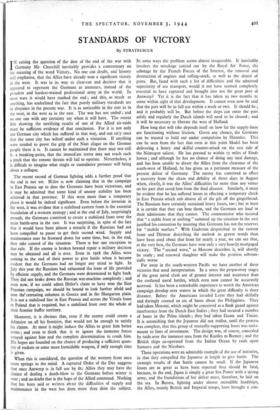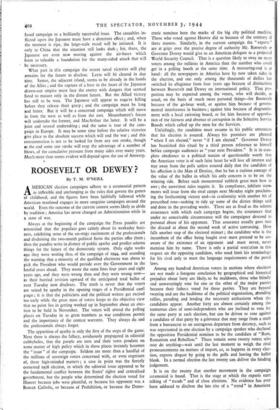STANDARDS OF VICTORY
By STRATEGICUS
IN raising the question of the date of the end of the war with Germany Mr. Churchill inevitably provides a commentary on the meaning of the word Victory.. No one can doubt, and history will emphasise, that the Allies have already won a significant victory in the west. It was in its way so clear-cut and decisive that it appeared to represent the Germans as amateurs, instead of the proudest and hardest-trained professional army in the world. In most wars it would have marked the end ; and this, as much as anything, has underlined the fact that purely military standards are in abeyance in the present war. It is as noticeable in the east as in the west, in the west as in the east. The war has not ended ; and no one can with any certainty say when it will have. The recent film showing the terrifying results of one of the Allied air-raids must be sufficient evidence of that conclusion. For it is not only one German city which has suffered in that way, and not on:y once that the same city has wilted' under such a visitation. If anything were needed to prove the grip of the Nazi clique on the German people there it is. It cannot be maintained that there may nor still b.: a breaking-point, that the immediate terror may not reach such a pitch that the remote threats will fail to operate. Nevertheless, it is difficult to imagine what single or cumulative pressure will bring
about a collapse. . .
The recent record of German fighting adds a further proof that the end is not yet_ Hitler is not, claiming that in the campaign in East Prussia up to date the Germans have been victorious, and it may be admitted that some kind of uneasy stability has been achieved in that province. If this were more than a temporary phase it would be indeed significant. Even before the invasion in the west, it was evident that a stabilised eastern front is the essential foundation of a western strategy ; and at the end of July, surprisingly enough, the Germans contrived to create a stabilised front over the main battle-area in the east. It was surprising, in spite of the fact that it would have been almost a miracle if the Russians had not been compelled to pause to get their second wind. Supply and maintenance may be frowned down for some time, but, in the end, they take control of the situation. There is but one exception. to that rule. If the enemy is broken beyond repair a military decision may be obtained and all is over. Even in 1918 the Allies were coming to the end of their power to give battle when it became evident that the Germans had no longer any mind to fight. In July this year the Russians had exhausted the lease of life provided by efficient supply, and the Germans were determined to fight back. They did not brake down the Russian war-machine completely ; and even now, if we could admit Hitler's claim to have won the East Prussian campaign, we should be bound to look further afield and note the retreating columns in Greece and in the Hungarian plain. It is not a stabilised line in East Prussia and across the Vistula front in Poland that is required, but a stabilised front over the whole of their frontier buffer territory.
Moreover, it is obvious that, even if the enemy could create a defensive on all his frontiers, that would not be enough to satisfy his claims. At most it might induce the Allies to grant him better terms ; and even to think that is to ignore the immense forces arrayed against him and the complete determination to crush him. His hopes are founded on the chance of producing a sufficient quan- tity of rockets or some more formidable weapon, if only enough time is given.
When this is considered, the question of the western front once more springs to the mind. A captured Order of the Day suggests that once Antwerp is in full use by thz Allies they may have the chance of dealing a death-blow to the Germans before winter is over ; and no doubt that is the hope of the Allied command. Nothing that has been said or written about the difficulties of supply and maintenance in the west has done more than skim the subject.
In some ways the problem seems almost insuperable. It inevitably, involves the wreckage carried out by the Royal Air Force, the sabotage by the French Forces of the Interior, the removal and destruction of engines and rolling-stock, as well as the denial of ports. But, faced with such a list of difficulties and the admitted superiority of sea transport, would it not have seemed completely essential to have captured and brought into use the great port of Antwerp? Yet it is the fact that it has taken us two months to come within sight of that development. It cannot even now be said that the port will be in full use within a week or two. It should be ; and it probably will be. But before the ships can enter the port safely and regularly the Dutch islands will need to be cleared ; and it will be necessary to liberate the west of Holland.
How long that will take depends itself on how far the supply-lines are functioning without friction. Given any chance, the Germans can be trusted to hold out under compulsion by Himmler. This can be seen from the fact that even at this point Model has been delivering a heavy and skilful counter-attack on the east side of the Nijmegen salient. He has pressed to within 15 miles of Eind- hoven ; and although he has no chance of doing any %fatal damage, and has been unable to divert the Allies from the clearance of the south-west of Holland, he has given us a pertinent measure of the present defeat of Germany. The enemy has contrived to effect a recovery from the chaos and debility of those days in August when, clearly, it was the Allies' difficulties far more than any virtue on his part that saved him from the final disaster. Similarly, it must be evident that he has suffered losses in effecting a temporary check in East Prussia which rub almost all of the gilt off the gingerbread. The Russians have certainly sustained heavy losses, too ; but at least it is certain that they can bear them, and the Germans are loud in their admissions that they cannot. The commentator who insisted that " a stable front or nothing " summed up the situation in the east justified his contention by insisting that Germany has not the reserves for " mobile warfare." With Guderian despatched to the eastern front and Dittmar describing the outlook in graver words than have been used about that front for nearly a year, we can see that, at the very best, the Germans have won only a very heavily mortgaged victory. The " second wave," as Moscow describes it, will shortly be ready ; and renewed slaughter will make the position substan- tially worse.
Far away in the south-western Pacific we have another of these victories that need interpretation. In a sense the preparatory stages of the great naval clash are of greater interest and assurance than the confused naval battles, which even now cannot be accurately assessed. It has been a remarkable experience to watch the American campaign develop over waters in which the great difficulty is sheer distance. Before the Americans invaded Leyte they had skilfully and daringly created an arc of bases about the Philippines. They had taken Morotai, which might be conceived as a flank guard against interference from the Dutch East Indies ; they had secured a number of bases in the Peleu islands ; they had taken Guam and Tinian. It is astonishing that the Japanese did not realise, until the process was complete, that this group of mutually-supporting bases was tanta- mount to lines of investment. The design was, of course, concealed by raids over the immense area from the Kuriles to Borneo ; and the British ships co-operated from the Indian Ocean by raids upon Sumatra and the Nicobars.
These operations were an admirable example of the use of initiative, in that they compelled the Japanese at length to give battle. The strategic results of that battle cannot be small. If the Japanese losses are as great as have been reported they should be fatal, because, in the end, Japan is simply a great Sea Power with a strong army, and the foundations of her defeat must, therefore, be laid on the sea. In Burma, fighting under almost incredible hardships, the Allies, mainly British and Imperial troops, have brought a con- fused campaign to a brilliantly successful issue. The casualties in- flicted upon the Japanese must have a deterrent effect ; and, when the moment is ripe, the large-scale recoil will be initiated. It is only in China that the situation still looks dark ; for, there, the Japanese are even now moving against the air-bases- which form so valuable a foundation for the many-sided attack that will be necessary.
What part in this campaign the recent naval victories will play remains for the future to disclose. Leyte will be cleared in due time. Samar, the adjacent island, seems to be already in the hands of the Allies ; and the capture of a base in the heart of the Japanese drawn-out empire must face the enemy with dangers that seemed fated to mature only in the distant future. But the Allied victory has still to be won. The Japanese still appear to require killing before they release their grasp ; and the campaign must be long and bitter. But it will be a concerted campaign which will move in from the west as well as from the east. Mountbatten's forces will undertake the former, and MacArthur the latter. It will be a joint and several undertaking ; and the same is true of the cam- paign in Europe. It may be some time before the relative victories give place to the absolute success which will end the war ; and this consummation is not to be looked for from any one stroke, though at the end some one stroke will reap the advantage of a number of blows, of the cumulative pressure from many sides over many years. Much more than seems evident will depend upon the use of Antwerp.



























 Previous page
Previous page